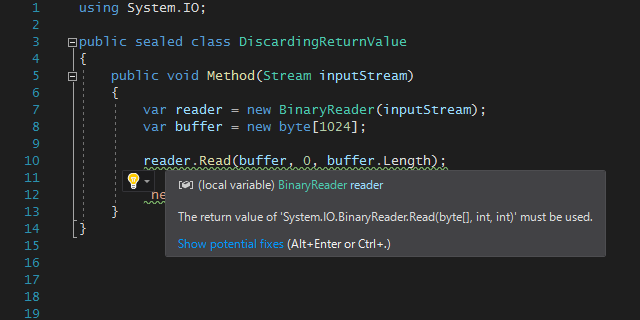DiscardingReturnValue

Summary
Do not discard the return value of some methods.
Default severity
Warning
Description
There are delicate methods that return a regardful value, or that do not make sense if the return value is discarded. This rule reports diagnostic information as a warning similar to CA1806 (Do not ignore method results)[1] about discarding the return value of the methods as follows:
- Some
Readmethods returning the number of bytes read actually - Some methods of immutable classes (e.g.
string,ImmutableArray, ...) - Methods whose return value is annotated with the custom attribute
- Methods specified with the configuration file
StyleChecker.xml
Read — POSIX read(2) style methods
The following methods are covered:
System.IO.Stream.Read(byte[], int, int)System.IO.BinaryReader.Read(byte[], int, int)
These read methods don't guarantee to read requested bytes
even when the end of the stream has not been reached.
See the specifications of
Stream.Read Method
[2], which are quoted as follows:
Remarks
... Implementations return the number of bytes read. The implementation will block until at least one byte of data can be read, in the event that no data is available. Read returns 0 only when there is no more data in the stream and no more is expected (such as a closed socket or end of file). An implementation is free to return fewer bytes than requested even if the end of the stream has not been reached.
And the specifications of BinaryReader.Read Method [2], which are quoted as follows:
Returns
The number of bytes read into buffer. This might be less than the number of bytes requested if that many bytes are not available, or it might be zero if the end of the stream is reached.
So, if the return value is discarded, the actual length of read bytes is unknown, which doesn't make sense.
There is a useful common pattern using the readFully-like code as follows:
Stream stream = ...;
byte[] buffer = ...;
int initialOffset = ...;
int offset = initialOffset
int length = ...;
while (length > 0)
{
var size = stream.Read(buffer, offset, length);
if (size == 0)
{
break;
// or throw new EndOfStreamException();
}
offset += size;
length -= size;
}
// Here, the actual read length is (offset - initialOffset).
Methods of immutable types
The following methods, that have no side effects and that do not make sense if the return value is discarded, are subject to the diagnostics:
- all
stringmethods (except ones returningvoid) - all
System.Typemethods (except ones returningvoidandInvokeMembermethods) - all methods of
ImmutableArray,ImmutableDictionary,ImmutableHashSet,ImmutableList,ImmutableQueue,ImmutableSortedDictionary,ImmutableSortedSet,ImmutableStacktypes in namespaceSystem.Collections.Immutable
The description of CA1806 is quoted as follows:
Rule Description
Unnecessary object creation and the associated garbage collection of the unused object degrade performance.
However, those who discard the return value of the method having no side effects
are just confused in many cases. For example, the string modification methods
are typical. The specifications of
System.String Class
[2]
are quoted as follows:
Important
All string modification methods return a new String object. They don't modify the value of the current instance.
It is important that all modification methods of immutable objects always return the new unshared object for every call, so discarding the return value of those methods doesn't make sense. In the same way, any other methods without side effects also are wasteful if their return value is ignored.
Methods whose return value is annotated
The methods that are not of the standard API can be covered
with DoNotIgnoreAttribute provided with
StyleChecker.Annotations.
The methods are covered if the return value is annotated
with DoNotIgnoreAttribute as follows:
using Maroontress.StyleChecker.Annotations;
public class Class
{
[return: DoNotIgnore]
public void Method()
{
return new ImmutableValue();
}
}
Methods specified with the configuration file
If DoNotIgnoreAttribute is not available,
you can specify methods with the configuration file StyleChecker.xml.
For example, if you would like to make sure that the return values of
int.Parse(string) method and Array.Empty<T>() method are not discarded,
edit StyleChecker.xml file as follows:
<?xml version="1.0" encoding="utf-8" ?>
<config xmlns="https://maroontress.com/StyleChecker/config.v1">
⋮
<DiscardingReturnValue>
<method id="int.Parse(string)"/>
<method id="System.Array.Empty<T>()"/>
</DiscardingReturnValue>
⋮
</config>
The DiscardingReturnValue element can have method elements
as its child elements,
and the id attribute of the method element specifies the method whose
return value must not be ignored. The value of id attribute
must represent the fully-qualified type name (of the type containing it)
followed by its name and parameter types as follows:
FullyQualifiedTypeName.MethodName(ParameterTypeName1, ParameterTypeName2, …)
The type name must be fully-qualified,
but if there is the keyword for the type,
it must be the keyword instead of the type name.
For example, use int instead of System.Int32,
string instead of System.String, and so on.
If the type or method is a generic one,
the name must be of the original definition.
Note that the symbols '<' and '>' have to be escaped in an XML document
with "<" and ">", respectively.
Code fix
The code fix is not provided.
Example
Diagnostic
public void Method(Stream inputStream)
{
var reader = new BinaryReader(inputStream);
var buffer = new byte[1024];
reader.Read(buffer, 0, buffer.Length);
"hello".IndexOf("o");
}